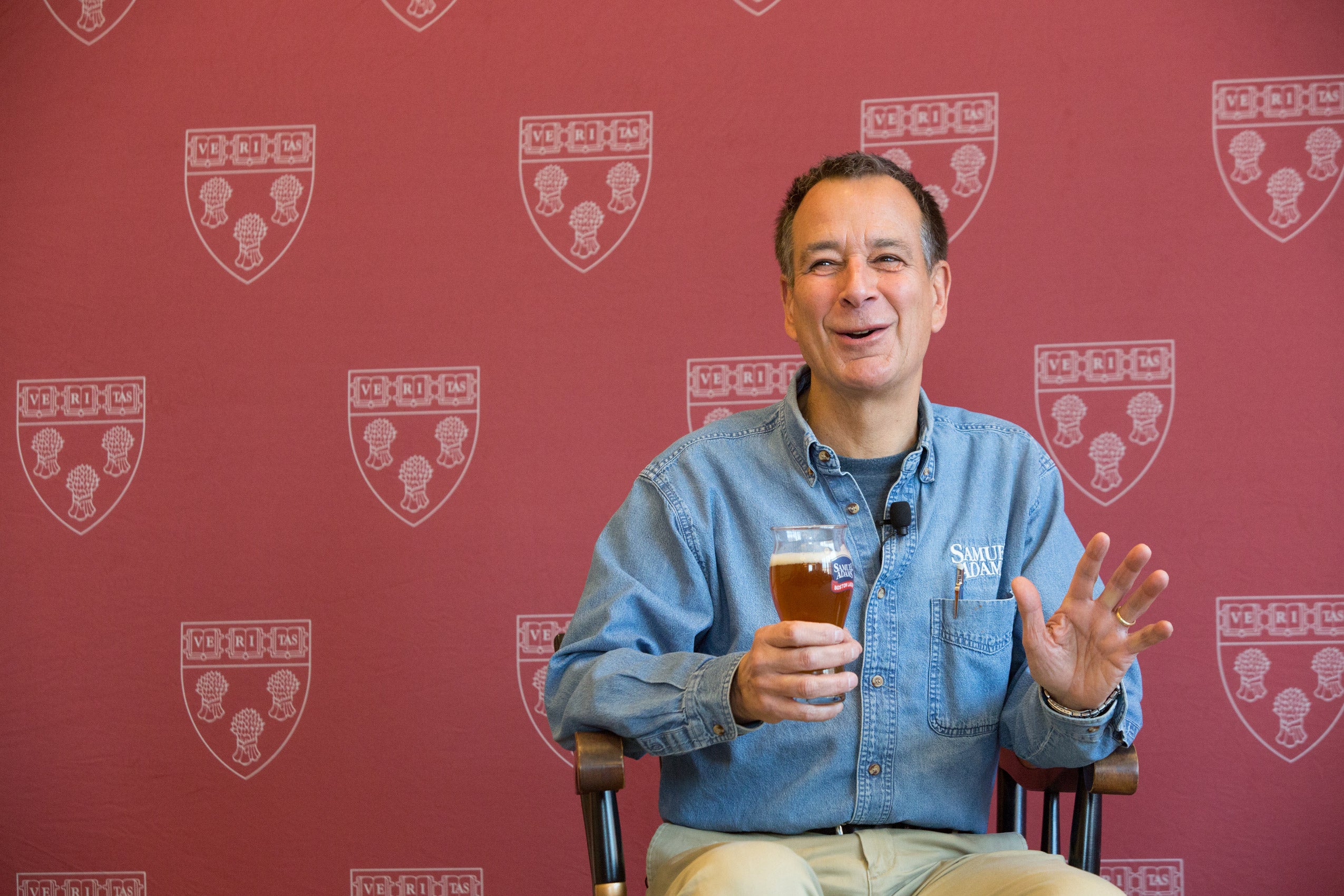Jim Koch ’71, JD/MBA ’78, founder and chairman of the Boston Beer Company and creator of its flagship Samuel Adams brew, is a renowned entrepreneur.
Koch shared the story of his unique journey with students when he returned to Harvard Law School on March 6 for a conversation with Dean Martha Minow. Their discussion spanned his roots in brewing, his time at (and away from) Harvard, and how he made the leap from a consulting job to starting his own business. The event was co-hosted by the Harvard Association for Law & Business and the Harvard Law School Alumni Center.
From Harvard to Outward Bound, and back again
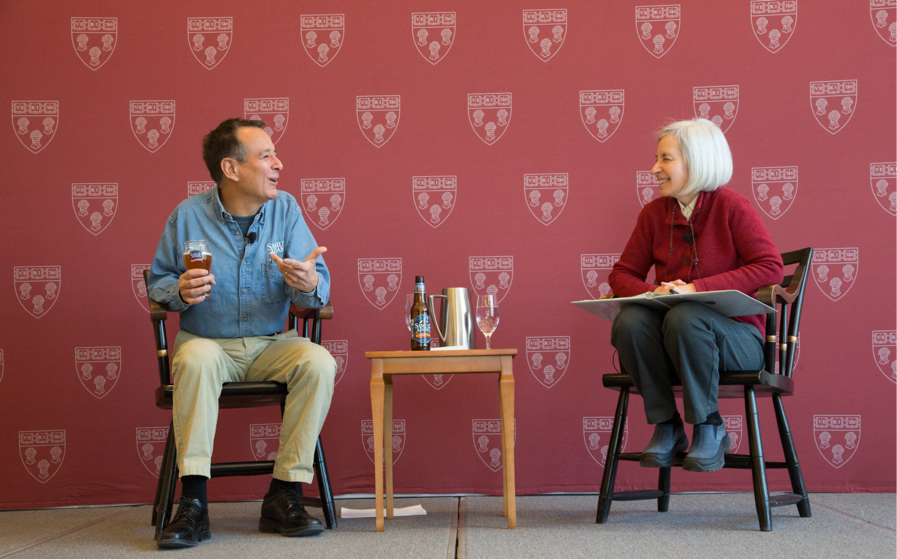
Born and raised in Ohio, Koch grew up in a family that had been brewing beer for five generations, but his father discouraged him from taking the same path. At the time, a handful of corporations controlled the vast majority of beer production in the U.S., and the outlook for small-batch breweries was bleak.
After graduating from Harvard College in 1971, Koch enrolled in Harvard’s joint JD-MBA program. After a year, however, he felt that something was missing.
“I left Harvard for three years,” Koch told Minow. “I hadn’t done anything but go to school. I felt limited—how can I make a career if all I know how to do is be in nineteenth grade?”
Minow noted that Koch was ahead of his time, as there has since been a shift in Law School admissions, with the school now preferring students who have work experience.
During his time away, Koch worked odd jobs and as a legal clerk. He also took a position with Outward Bound, where he taught wilderness travel and whitewater rafting. “This period helped me learn that I could live without making a lot of money,” Koch said. “And I learned about values and leadership in Outward Bound.”
Koch returned to Harvard and received his joint degree in 1978. He then worked at global management firm Boston Consulting Group for six years, which he called “a great experience.” Beer, however, was always one of his passions.
An idea sparked by a family recipe
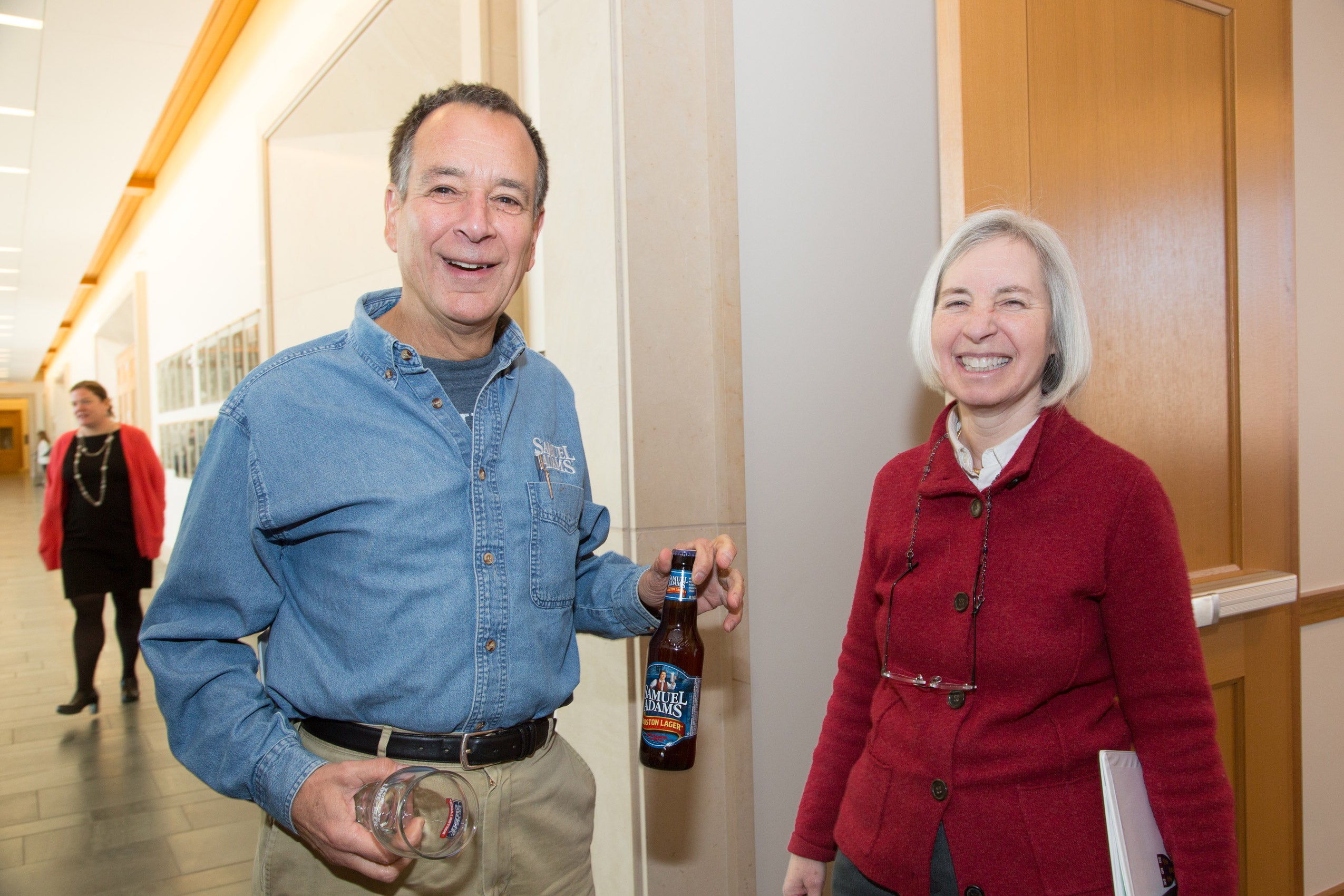
“Beer is in my blood—point zero six, actually,” said Koch, who enjoyed a Sam Adams during the conversation, to laughter from the audience. “But my father didn’t want me to go into it. The business was contracting, and he didn’t see the opportunities created by consolidation.”
Koch saw a small opportunity for hand-crafted, flavorful beer. In 1984, using the same recipe and brewing processes that his great-great-grandfather followed, Koch launched the Boston Beer Company. Six weeks after its introduction, Samuel Adams Boston Lager was selected as the Best Beer in America in The Great American Beer Festival’s Consumer Preference Poll, an award it went on to win an unprecedented four times. Today, the Boston Beer Company produces and sells more than 50 styles of beer, along with hard ciders and malt beverages, in every U.S. state and in 20 countries.
Good selling isn’t sleaze like you see in the movies, it’s figuring out how what you have to offer can help another person achieve their objectives. It forces you outside yourself and your own needs, and makes you empathize with others’ needs.
Jim Koch ’71, JD/MBA ’78, founder and chairman of the Boston Beer Company
Koch admitted that he did not expect his company would become as successful as it did. “I had a business plan, but this was the 1980s, and entrepreneurship was not seen as positively as it is now,” he said. “Why start my own business? Big companies struck me as necessary, but prohibitive to self-expression. Outward Bound taught me about subjective versus objective fear—what is dangerous versus what is just scary. Starting a business was scary, but what was really dangerous was not starting this company and wasting my life.”
Asked to share the best advice he had ever received, Koch recounted a conversation with a friend that occurred just as he started his company. “I was talking about buying computers to track sales,” Koch said, “And my friend asked, ‘Okay, but do you have any sales? I’ve seen plenty of businesses that had computers, but they went broke because they didn’t have sales. Go out and sell beers.’ The idea of being a beer salesman after my education and career frightened me. My education was protection because it gave me status and self-image, but I had to leave that behind.”
Koch sold his beer by walking from bar to bar. “It was a wonderful experience with the fury and muck of human contact, which we don’t tend to value,” he said. “Learning to sell is an enriching and ennobling experience.”
Minow noted that everyone has to know how to sell, even professors at the Law School who have to promote their ideas and research. “How do you find your ideal audience?” she asked Koch.
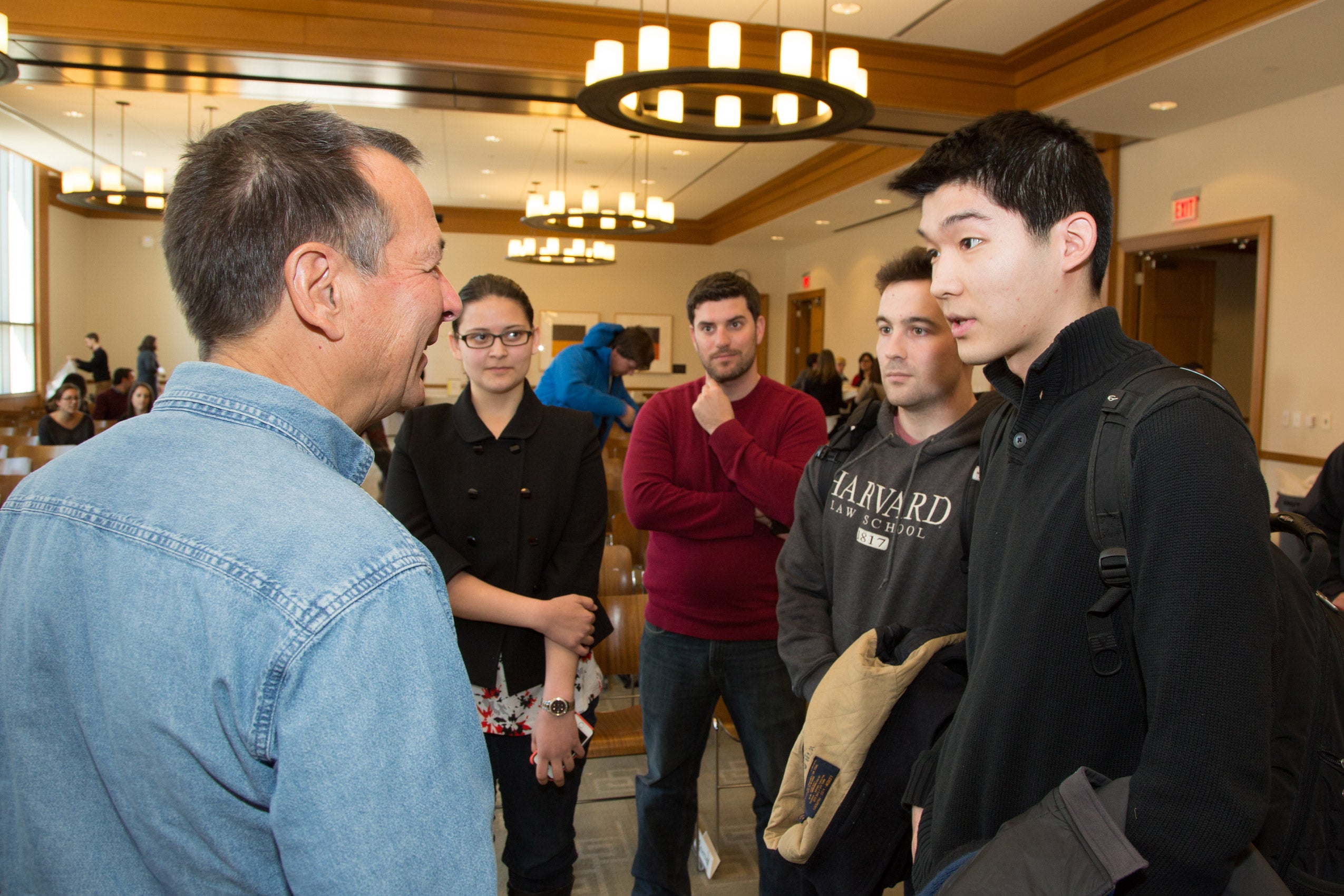
“Good selling isn’t sleaze like you see in the movies,” Koch said. “It’s figuring out how what you have to offer can help another person achieve their objectives. It forces you outside yourself and your own needs, and makes you empathize with others’ needs.”
In response to Minow’s question about what makes a great company, beer or otherwise, Koch said, “It’s fascinating to be here because Harvard has done it. The University has lasted longer than any company. I would say it’s adherence to an evolving mission.” Minow echoed this sentiment, adding that you need a purpose that motivates you and others. Koch agreed, describing the creativity inherent in his company’s mission: “People tend to think about beer in a constrained way—what they’ve observed or experienced. Brewers are different than winemakers, who have only one ingredient, grapes. With beer, any ingredient can be used. A brewer can be like a chef.”
Koch is also known to hire people who are passionate about the product, and for following the mantra to “never hire someone unless they raise the average for the company.”
“Our process is demanding. I ask, ‘Who will bring something I don’t have?’” Koch said. When he started his company, he brought Rhonda Kallman, an administrative assistant at Boston Consulting Group, with him. “She didn’t have a fancy degree, but she had people skills and enthusiasm. She ended up building our sales group from the ground up. While this country is a meritocracy, there is also a caste system based on education that can lead to wasted talent. The strength of the U.S., historically, is that it takes advantage of everyone’s talents.”
Looking ahead, paying it forward
The Boston Beer Company recently celebrated its 30th anniversary, but Koch has not rested on his laurels. “I have to keep some perspective,” he said. “We’re still only one percent of the overall beer market. Maybe someday we’ll get to two percent.”
When asked how his company continues to innovate and succeed, Koch said, “Honestly, I get bored easily. Growth and new things are motivating to me.” Gesturing to the gathered students, he added, “I like to get up and do something new every morning—like this, this is awesome!”
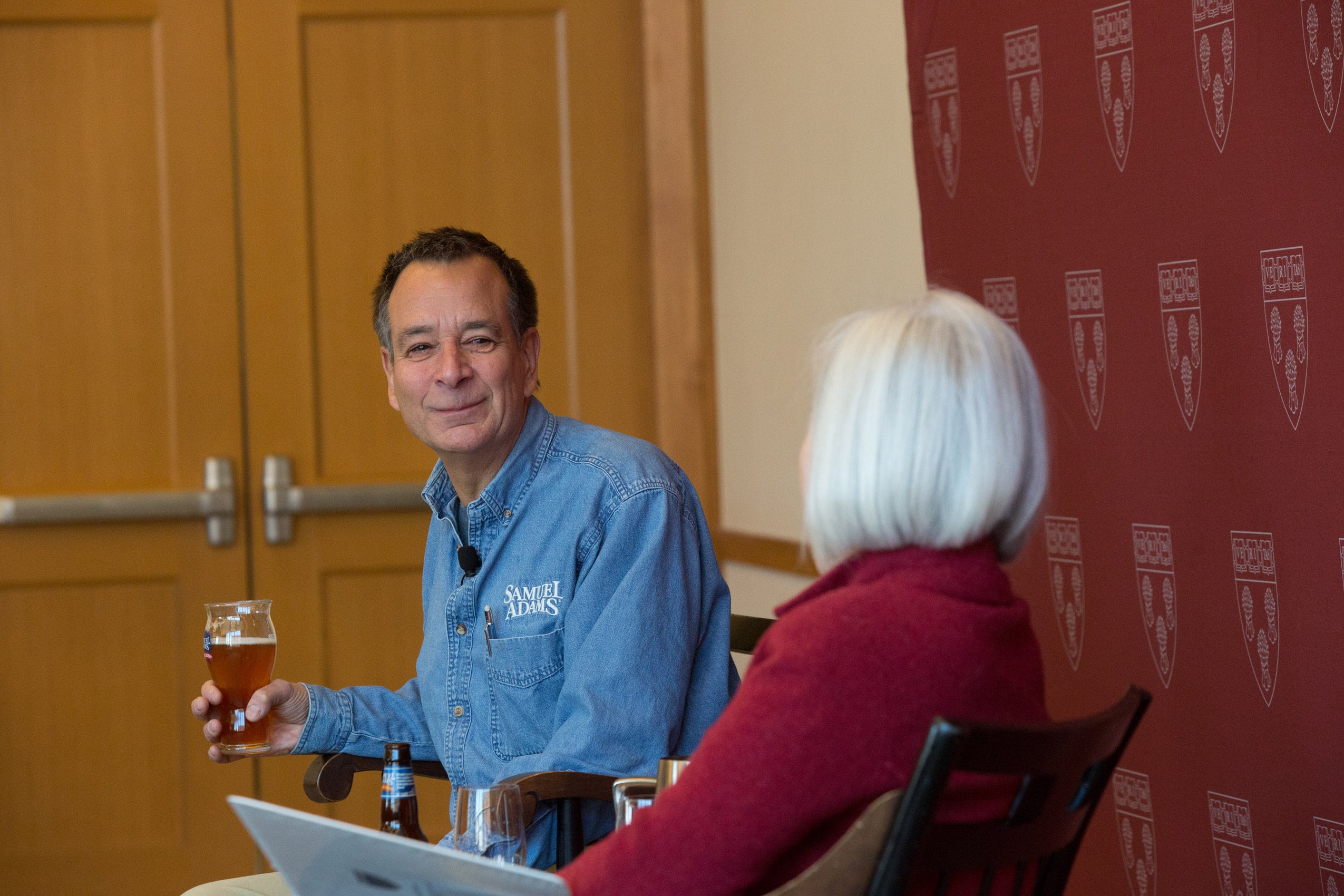
Koch’s company may no longer be considered a startup business, but it remains committed to entrepreneurship and risk-taking. Through the Samuel Adams Brewing the American Dream program, it has helped more than 300 food, beverage, craft brewing, and hospitality startups succeed through coaching, advising, and access to microloans.
“There is a funding gap for very small businesses. We make loans and make sure they’re repaid, and we offer speed coaching,” Koch said, adding that social responsibility is also a key part of a company’s mission. “A company can add real value to the world. This program also helps keep us in touch with our small business roots.”
Advice for today’s students
When a student asked for Koch’s thoughts on starting a craft brewery in today’s crowded market, Koch was candid. “Two craft breweries open every day in this country,” he said. “It is very competitive. But if it makes you happy, do it. You’re better off being happy than rich. Being rich is a booby prize for people who didn’t get what they really wanted.”
Koch also encouraged students to consider all options for their future. “Think about your career like this: Everything is open to you,” Koch said. “Forget about the piece of paper that says where you graduated from. You got yourself here, so your drive and energy will help you succeed anywhere.”
To close the conversation, Minow mentioned the many U.S. presidents who have been brewers, from the first in office through President Obama. “Is there something about being a civic leader and being a brewer?” she asked.
“The history of brewing in the United States actually goes back even before Harvard was founded. The first brewery in the English colonies opened in 1635,” Koch said. “So it seems you have to have beer before you can have law.”
